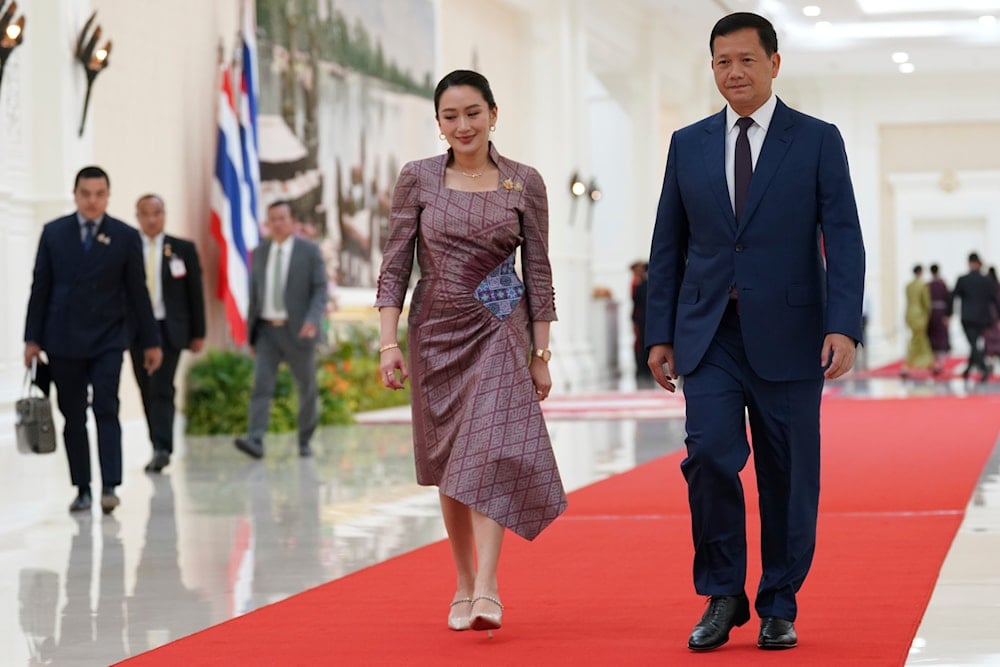Thailand, Cambodia pull troops back to 2024 positions
Thailand and Cambodia agree to withdraw troops to 2024 positions after border clash in Emerald Triangle, ahead of June boundary talks.
-

Thailand Prime Minister Paetongtarn Shinawatra, center, accompanied by Cambodian counterpart Hun Manet, right, arrives for a meeting at Peace Palace in Phnom Penh, Cambodia, April 23, 2025. (AP)
Thailand and Cambodia engaged in a new round of negotiations, during which they agreed to pull back their troops from the area of the May 28 border clash to the positions they had occupied in 2024, as announced by Thai Deputy Prime Minister and Defense Minister Phumtham Wechayachai on Sunday.
"During the talks, which included military personnel from both sides, we have reached an agreement to withdraw troops from the border to 2024 positions ... We have received information about negotiations between both sides at all levels of command [of the border area]," Phumtham said during a briefing.
The minister expressed gratitude on behalf of Thailand's defense ministry and armed forces, acknowledging the Cambodian government and military forward command for their constructive participation in the talks and their cooperative efforts to peacefully resolve the situation for the mutual benefit of both nations.
Thai media have released images of the conflict zone where the recent clashes occurred, showing that Cambodian military personnel have withdrawn from their pre-clash positions and that the trench lines occupied during the confrontation have since been dismantled.
According to the Royal Thai Army, the Cambodian side had extended an invitation earlier in the day for bilateral discussions to address the ongoing issue, prompting the Thai delegation to engage in talks aimed at resolving the matter.
The ministry stated that both sides had reached a key agreement during initial talks, with Cambodia agreeing to withdraw troops to their 2024 positions to foster a positive environment for the upcoming June 14 boundary commission meeting.
Thailand and Cambodia also affirmed the use of the Local Border Committee mechanism for future discussions on the sustainable management of the disputed area.
On Saturday, the Royal Thai Army issued an order transferring control of border checkpoints under its command. The decision was justified by citing repeated provocations by Cambodian forces along the disputed frontier.
Separately, the army also released Thai intelligence reports detailing Cambodian military movements, where Cambodia had not only increased troop numbers in the area but had also placed its forces on heightened alert.
Thailand-Cambodia clash
Thailand and Cambodia have maintained a longstanding dispute over their shared border spanning more than 800 kilometers (500 miles), a boundary primarily established during the French colonial administration of Indochina.
On Monday, Cambodian Prime Minister Hun Manet announced that Cambodia would pursue legal action by submitting a formal complaint to the International Court of Justice regarding the ongoing border conflict.
While the International Court of Justice determined in 2013 that the contested territory rightfully belonged to Cambodia, Thailand maintains its position of rejecting the ICJ's authority over the matter.
Sporadic violence has persisted along the Thai-Cambodian frontier since 2008, leading to at least 28 deaths, including a Cambodian soldier who was killed in the most recent clash on May 28 in an area known as the Emerald Triangle, where the borders of Cambodia, Thailand, and Laos meet.

 3 Min Read
3 Min Read










